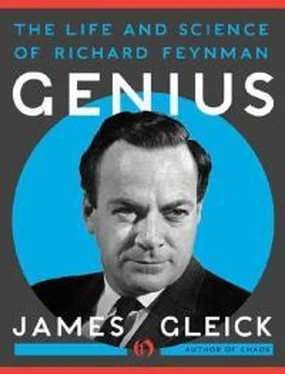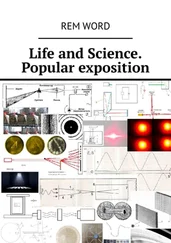Feynman concluded with a blunt catalog of the flaws in his thesis. It was a theory untested by any connection to
experiment. (He hoped to find an application to laboratory problems in the future.) The quantum mechanics remained nonrelativistic: a working version would have to take into account the distortions of Newtonian physics that occur near the speed of light. Above al he felt dissatisfied with the physical meaning of his equations. He felt they lacked a clear interpretation. Although few concepts in science seemed more frightening or abstruse than Schrödinger’s wave function, in fact the wave function had achieved a kind of visualizability for physicists, if only as a sort of probabilistic smudge at the edge of consciousness.
Feynman acknowledged that his scheme discarded even that fragment of a mental picture. Measurement was a problem: “In the mathematics we must describe the system for al times, and if a measurement is going to be made in the interval of interest, this fact must be put somehow into the equations from the start.” Time was a problem: his approach required, as he said, “speaking of states of the system at times very far from the present.” In the long run this would prove a virtue. For now it seemed to turn the method into a formalism with no ready physical interpretation. For Feynman, an unvisualizable formalism was anathema. The official thesis readers, Wheeler and Wigner, were unperturbed. In June Princeton awarded Feynman his doctoral degree. He attended the ceremony wearing the academic gown that had made him so uncomfortable three years before. He was proud in the presence of his parents. Fleetingly he was annoyed at sharing the platform with honorary-degree recipients; always pragmatic, he thought it was like giving an “honorary electrician’s license” to people who had not done the work.
He imagined being offered such an honor and told himself that he would turn it down.
Graduation removed one obstacle to marriage, but only one. According to medical and quasi-medical dogma, tuberculosis was a burden on love. “Should Consumptives Marry?” was the title of a chapter in Dr. Lawrence F. Flick’s 1903
monograph, Consumption
a Curable and
Preventable Disease . Not without gravely weighing the
“risks and burdens,” he warned. And:
The relationship between husband and wife is so intimate that even with great care there may be given opportunity
in
moments
of
forgetfulness
for
conveyance of the disease.
And:
Many a young consumptive mother gets her shroud shortly after she has purchased the christening frock for her babe.
A 1937 Manual of Tuberculosis for Nurses and Public Health Workers declared that marriage should be forbidden:
Marriage is apt to be a very expensive and dangerous luxury to those who are suffering, or have recently suffered, from tuberculosis of the lungs… . If the patient is a woman, she has not only to face the risk of infecting her husband and her children, but she must take into consideration the fact that pregnancy is liable to aggravate existing disease.
As late as 1952 an authoritative text cited Somerset Maugham’s short story “Sanatorium,” about a young couple in love who disregard the customary strictures.
They were both so young and brave that it was a great pity… . One could wish the novelist would rewrite the story with the boy and girl sensibly waiting for several years… . I am addicted to happy endings.
The textbook phrases gave no hint of the howling whirlpool of emotions that came when love and tuberculosis combined. Richard’s parents dreaded his marriage to Arline. Lucil e Feynman, especial y, found the idea impossible to bear. Her dealings with her son became harsher as she realized how serious his intention was. In the late spring she sent him a cold, handwritten screed bristling with her fear for his health, her fear for his career, her worry about money, and, indirectly, her revulsion at the possibility of sexual relations. She held nothing in reserve.
“Your health is in danger, no I should say your life is in danger,” she wrote. “It is only natural that when you are married you wil see more of her.” She worried about what other people would think (an enemy against which Richard and Arline were learning to circle the wagons).
Tuberculosis carried a stigma, and the stigma would attach to Richard. “People dread T.B. When you have a wife in a T.B. sanatorium, no one knows it is not a real marriage. & I know the world considers such a man dangerous to associate with.” She told Richard that he was not earning enough money, that he had been loyal enough already, and that Arline “should be satisfied with the status of
‘engagement’ instead of ‘marriage,’ because in such a marriage you are not getting any of the pleasures of marriage, but only the severe burden.” She warned that she and Melvil e would not help the couple with money under any circumstances. She appealed to his patriotism, saying that the burden of a sick wife would compromise his ability to serve his country. She reminded him that his grandparents had fled European persecution and pogroms for a country whose freedom he took for granted. “Your marriage at this time, seems a selfish thing to do, just to please one person.” She doubted that he sincerely wanted to marry Arline; she asked whether he was not merely trying to please her, “just as you used to occasional y eat spinach to please me.” She said that she loved him and hated to see him make a noble but useless gesture. She said, “I was surprised to learn such a marriage is not unlawful. It ought to be.”
Melvil e took a calmer tack. He asked Richard to get professional advice at Princeton, and Richard obeyed, consulting his department chairman, Smyth, and the university doctor. Smyth merely said he preferred to keep out of his staff’s private affairs. He kept to that position even when Feynman went to the extreme of pointing out that he would be in contact both with a tubercular wife and with students. The doctor was concerned to make sure that Feynman understood the danger of pregnancy, and Feynman told him they did not intend to make love. (The doctor noted that tuberculosis was an infectious rather than a contagious disease, and Feynman, typical y, pressed him on that point. He had a suspicion that the distinction was an artifact of unscientific medical jargon—that, if there was a
difference at al , it was a difference of degree only.) He told his father that he and Arline did not plan to marry any time within the next year. But just a few days later, having received his degree and his new status, he wrote back to his mother, proudly updating his letterhead by penning “Ph.D.” after the printed “Richard Feynman.” He tried to respond reasonably to each argument. Neither Smyth nor the university physician were concerned about any danger to his health, he said. If marriage to Arline would be a burden, it was a burden he coveted. He had realized one day, arranging Arline’s transfer to the sanatorium nearby, that he was actual y singing aloud with the sheer pleasure of planning their life together. As far as his duty to country was concerned, he would do whatever was necessary and go wherever he was sent. It was not that he wanted to be noble, he told his mother. Nor was it that he felt obliged to keep a promise he had made years before under different circumstances.
Marrying Arline was distinctly different from spinach. He did not like spinach. Anyway, he said, he had not eaten spinach out of love for his mother. “You misunderstood my motives as a smal boy—I didn’t want you angry at me.”
He had made up his mind. He moved into a flat at 44
Washington Road immediately after graduation and for a while did not even tel his mother the address. He rapidly made the final arrangements—as Arline said, “in no time flat”:
Читать дальше












